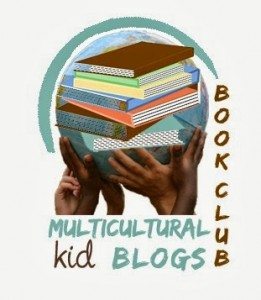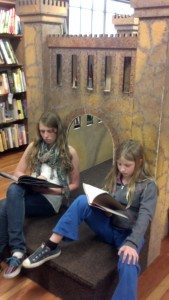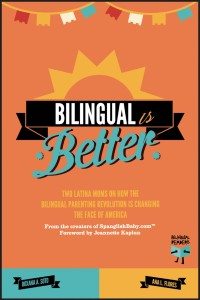 I’ll start this week’s chapter chat with a joke my kids told me:
I’ll start this week’s chapter chat with a joke my kids told me:
What do you call a person who speaks two languages?
– Bilingual
What do you call a person who speaks three languages?
– Trilingual
All right then. What do you call a person who speaks only one language?
– American
 And, just to be clear. That’s “American” with a derogatory tone. I’m so proud that my kids think this joke is funny! When I was in college, I took a seminar in which we had to describe the three things we really wanted to give our children. I don’t even remember the first two things I listed. Most likely something like “a roof” and “love”. But I remember the somewhat desperate feeling I had about the third thing – “a second language.” I knew even then that my horizons were limited by my monolingualism and it seemed daunting to dream of doing better for my own kids. As you can imagine, when Multicultural Kid Blogs offered up a book club on Bilingual is Better by Ana Flores and Roxana Soto, I jumped at the chance. I picked Chapter Two: Why Bilingual is Better. The discussion of Chapter 1 was sparked by a great post hosted by Spanish Playground.
And, just to be clear. That’s “American” with a derogatory tone. I’m so proud that my kids think this joke is funny! When I was in college, I took a seminar in which we had to describe the three things we really wanted to give our children. I don’t even remember the first two things I listed. Most likely something like “a roof” and “love”. But I remember the somewhat desperate feeling I had about the third thing – “a second language.” I knew even then that my horizons were limited by my monolingualism and it seemed daunting to dream of doing better for my own kids. As you can imagine, when Multicultural Kid Blogs offered up a book club on Bilingual is Better by Ana Flores and Roxana Soto, I jumped at the chance. I picked Chapter Two: Why Bilingual is Better. The discussion of Chapter 1 was sparked by a great post hosted by Spanish Playground.
Chapter 2: Bilingual is Better
 In this chapter, Ana and Roxana present the evidence – the science, the passion, and the personal anecdotes – that build a case for raising bilingual children. They start by debunking common myths about the risks of bilingualism. They go on to convince the reader with scientific studies on the advantages of bilingualism for everything from concentration to reading speed to cardiac health. They conclude with their own personal anecdotes and experience raising bilingual children. The very end of the chapter is interactive. They ask the reader to be explicit about their own reasons for raising a bilingual child.
In this chapter, Ana and Roxana present the evidence – the science, the passion, and the personal anecdotes – that build a case for raising bilingual children. They start by debunking common myths about the risks of bilingualism. They go on to convince the reader with scientific studies on the advantages of bilingualism for everything from concentration to reading speed to cardiac health. They conclude with their own personal anecdotes and experience raising bilingual children. The very end of the chapter is interactive. They ask the reader to be explicit about their own reasons for raising a bilingual child.
Personal reflections
So, what are our reasons for raising bilingual children? Wait, wait, you ask … aren’t I a monolingual American? My cultural heritage includes a pilgrim ship, New York City, and macaroni and cheese. My husband brings the Great Lakes, maple syrup, hockey, and two years of high school German – ‘Das klavier ist kaput!’. What happened?
We moved to the suburbs of Seattle about 12 years ago, pretty much kicking and screaming. My job was near the city; his job was in the mountains. We simply divided one horrific commute into two unpleasant ones and found a house we could live with. I’d like to say that, as good parents, we planned this move to land in an amazing school district with a wondrous Spanish immersion program. We actually didn’t even consider schools when we moved. We could have ended up in a pretty difficult situation. Instead, we won the lottery – literally.
When we first heard that there was a public Spanish immersion program (well after we had committed to the house), we thought we were fantastically lucky. My husband dragged our less than three year-old daughter to the kindergarten information night and we fell in love with the school, but you can only attend by lottery. When she was finally the right age for kindergarten, we hopefully put our name into that lottery and … whoops … we came up 53rd on the waiting list for about 35 spots. We gave up and we tried not to look back. Half way through first grade, we got the call - “Your daughter’s name just came up for a place in 1st grade in Spanish immersion. Can you please tell me by tomorrow if you want the spot?” Chaos ensued. We begged for 48 hours; we talked to everyone we knew; we cried at the thought of leaving our current school community; we visited the school and thought -“It’s too late. We have no idea what the teacher is saying. Our daughter speaks about four words of Spanish. It’s impossible.” But then we brought our daughter in. She listened. She watched kids her age, native English speakers, interacting in Spanish, and she said “I wanna’ do that!” What? We assumed she would be scared or intimidated but at six years old she knew. Learn the language or be locked out. We enrolled her and scored a spot for her little sister through the sibling preference program. They’re in high school and middle school now and as close to bilingual as the offspring of three plus generations of monolinguists can be. With the Spanish language has come culture, travel, new words and ideas, and a wonderful, prideful sense of identity.
At the end of the chapter, I was fascinated by the personal statements of both Ana and Roxana. Their drives for bilingualism are so closely tied to family and cultural heritage. I’m embarrassed to admit this but I really didn’t understand the cultural pressure on families not to teach, speak, or encourage bilingualism. It’s something I had always wanted and didn’t really understand why so many immigrant families didn’t support it. I’m saddened by what I read in Chapter 1 but, perhaps, re-energized to speak more loudly and more often about what a gift bilingualism is and about how much our family values the Spanish language and the many cultures and ideas it has brought into our home.

What are the reasons we deeply believe that bilingualism is a gift? First, each language you learn opens a door to people you couldn’t otherwise know. Language is a portal. I wish for my children that they can choose their life’s friendships from all the wonderful people in the world. Second, words and ideas are intricately tied. It’s hard to have an idea if you don’t have a word for it. For example, there is a word in Danish, “hygge”. It translates to something like cozy, or intimate, perhaps relaxing or even “full of connection.” It can refer to a dinner nook or to a whole evening and it’s an idea we simply don’t have in English; yet, we all enjoy a hygge evening with friends. So, more words, more ideas. More grammar, more ways to link ideas. Thirdly, language carries culture. By learning Spanish, our children have a latina tongue. OK, it’s not blood. They don’t have any biological latina heritage. But, they are first generation latina culturally and linguistically. They mock and are embarrassed by our efforts to speak Spanish publicly and they feel that they have a passport to all the Spanish-speaking countries of the world. It is the gift I dreamed of giving them so long ago.
Lines that spoke to me
We are born with the innate ability to learn more than one language, yet we, as a culture, prefer to ignore such amazing brain capacity … (p 68).
Yes! There is a piece of me that simply wants my children to exercise their brains, to have a challenge as they learn, and to increase the flexibility within those brains for other ways of thinking about and imagining the world.
“One who speaks only one language is one person, but one who speaks two languages is two people” – Turkish Proverb (p 81).
What can I say? My first thought when I read this was, “Uh-oh we’re a little late in introducing a third language. We better get started.”
Questions
– What is the primary reason that you are choosing to raise your children bilingually or choosing not to?
– What kinds of research and evidence did you consider before making your decision?
– What other languages aside from Spanish and English do you wish for your children and why?
Post your ideas in the comments below or follow the conversation on our Google+ Community. You can also link up your blog post about this chapter.


What a wonderful article! Your family’s experience clearly speaks to the potential of quality immersion programs. I have faith that those opportunities will continue to become more available, in part because a generation of children like yours will soon want similar situations for their own kids.
As a language educator, I knew all the research supported early language learning for true fluency. I was also very aware of how that research is often misrepresented in the press. For example, all of the research done on the ability to acquire native speaker pronunciation before adolescence was done on children who moved into complete immersion situations. It is often touted as the reason for getting kids into an after-school program, and yet it really doesn’t apply at all. In general, I think that parents are not aware of the amount of exposure it takes to acquire a language, although I do think that is changing.
My kids found a third language came easily, although they did choose languages closely related to Spanish. My youngest speaks French and my oldest speaks Portuguese.
Thank you for a great post!
Thanks Jenny. We’ve often discussed the native accent issue. I think it’s fascinating. For Spanish, since we have no family heritage, it’s not obvious what accent we’re aiming for – Spain? Columbia? Mexico? And there have been difficult discussions at the school when trying to find new teachers about the value of teachers who are Native speakers (maybe with less teaching experience or a pedagogical approach that doesn’t suit as well) versus non-Native but fluent speakers with, say, a science background or a super teaching history. It’s a complicated choice. In general all the teachers have been fabulous and dedicated so both possibilities seem to work and it’s the balance that seems most important.
I catch myself wondering about my 6 years of high school French. It wasn’t immersion, it was a lot of memorization, and it wasn’t taught by a Native speaker. A taxi drive in Paris told me (in French), “your accent is so terrible that no one will understand you.” BUT please note that we were, at the time, speaking in French. My accent may be poor but I can still experience rude Parisian taxi drivers. I could be understood, I could have a conversation, and I could make new friends. So there is big value in imperfect language skills. True bilingualism is fabulous but enough language to muddle through ordering a meal is still 1000 times better than no language.
One last thought (it’s hard to stop – this is fun!), a wonderful advantage that Americans have is that we value accents. We think that English spoken with an accent is beautiful and acceptable. I know we have prejudices against some accents but, in general, accents don’t impact one’s ability to be understood. I wish more visitors and immigrants could believe this. In Austria or in Thailand, my poor pronunciation was an impediment to conversation. While Americans are imperfect, we do excel at understanding and appreciating English through a wide variety of accents.
I’m excited for the third language! Thank for your thought-provoking reply!
I agree with you 100% that some language is 1000 times better than no language! That is what I always tell the parents of my students, stressing that finally it will up to the person (no longer a child) how they choose to pursue the language throughout their life.
I also tell them that like many other skills (piano, karate, dance) there is a tremendous amount to be gained in the process of learning, regardless of the final level of proficiency a child acquires. There will be a certain number of children who eventually choose to spend their time on different activities and educational endeavors, but that doesn’t mean they haven’t benefited from the exposure to the language they have had. If nothing else, they tend to see themselves as language learners and be more likely to study it again later.
Your observations about the value of imperfect language skills are exactly the kind information that I think parents should be receiving when they are considering how to teach their children a language. In my experience, they are often encouraged to have unrealistic expectations and then become discouraged at what their kids can’t do, instead of celebrating what they have learned.
I also agree about accents. I have often thought that the inclusivity of American society will at some point be reflected in a wider range of accents on television and radio and perhaps a more accepting view of grammar in some written work. I think that will be a good thing 🙂
Thanks Jenny! I absolutely agree. I might be a grammar nerd – I’ve only recently accepted split infinitives – but I’ll still take inclusivity over grammar perfection. I love your comments about the path being more important that than the final, specific skill. For early students, learning how to learn is so much more important than the facts and vocabulary memorized. Science is exactly the same – we teach facts and forget the amazing and transferable value of understanding and experimenting with the process of science. It is changing but it is slow.
You have no ideas the chills I had reading this post and the tears that swelled up in my eyes. When we wrote this we never, ever imagined the real and palpable impact it could have on so many people. It might not make the bestseller lists, but if we can motivate one person to understand why being bilingual is better, then that’s all we need.
You truly are lucky to have landed in that immersion program because they are so hard to come by. But it sounds like it was just meant to be for your girls.
I can’t thank you enough for writing this!
I am French but live in Brussels (Belgium). Belgium itself is a country with three languages: French, Dutch, German. It is probably not the best example of how people can live together with several languages, but they manage. I live in Brussels because I work as a civil servant for the European Union : 28 Member States / 24 languages. So I work with people whose native language is most likely different than mine… We usually manage speaking French or English, which gives me some kind of privilege as I am a native French speaker.
Many (most ?) couples around us are bi-national with spouses of different backgrounds. Most kids who attend school with our kids speak at least two languages (mom’s and dad’s), and quite often a third one as Brussels is mainly French speaking. Our kids are among the very few who only speak one language. Every single day, I feel guilty for not being able to give my kids a second language. Here in Brussels, bilingual programs are meant for bilingual kids only…
My kids used to attend what we call the “European school”. It is a huge school, with as many sections as languages. Kids have to attend the section of their mother tongue. Mine attended the French section, with kids from Romania and Bulgaria who did not have their own section yet. During the breaks, they met with a lot of other kids speaking many different languages. In first grade, kids were able to learn a “second language” (to be chosen among French, English or German) for 45 minutes a day, 4 days a week. The problem was that in the English class, most kids already knew English. So my daughter felt miserable. I think we did a good job in not letting her reject the idea of learning a foreign language, but I have to say I do not know how to proceed now. Any ideas would be welcome as I fully share your point on how new languages bring new ideas, new ways to link them, etc.
A few months ago, we went to China with our kids (8 and 6). Well advised by Bill and Ashley’s book, we took a few Chinese classes beforehand. Today, we were walking the dog in a small French town. Two Asian people were taking pictures. When they saw the kids, they turned the camera towards them. I joked with the kids that they were surely from China because of how many times they had been photographed over there. We were getting close to them and suddenly my son greeted them with a loud “nihao”. Guess what: they WERE Chinese! The woman could not believe it, she almost cried! The kids started speaking the few sentences they remembered from our trip. I am pretty sure these Chinese tourists will remember that forever. As we walked away, I highlighted to the kids how knowing even just a few words of foreign languages could open doors.
What an awesome story Camille. I’m really impressed that your kids were willing to speak to strangers in any language. Mine are nearly fluent in Spanish and yet still so shy to speak out without being sure who they are speaking to and what they plan to say. Once they’re rolling, they’re fine. By then, I have no idea what they’re saying but it seems like Spanish-speakers understand them just fine.
Your kids have plenty of time to learn English but they should get started! How about a nanny? 🙂 TV? Movies? After-school classes? Have you seen the Mitzy series? They have it in every language I think. We own it in German – ridiculously expensive but a fun way to reinforce language basics. Books on tape? Being bilingual is valuable anywhere but in Europe it seems essential.
Thanks for your thoughts!
I loved the way you combined talking about the chapter and relating it to your own experience. I also really liked the focus in the last few pages about the authors’ own reasons for valuing raising their kids bilingually and biculturally. I loved the two proverbs that Roxana Soto mentioned. As well as the Turkish would you mentioned in your post, I loved the Czech one (“you live a new life for every language you speak”). This really fits with my own experience. I’ve been on some many exciting adventures thanks to learning and becoming fluent in French, in both personal and professional terms. I’d say the same about learning to speak Welsh in the last six years even though the adventures, challenges and ways in which I’ve learned the language have been quite different from when I was learning French quite a few years before.
Thanks Jonathan. It was hard not to relate it to my own life. It’s been amazing to me too how much even bits of another language have changed my life. Being bilingual would be amazing. I wish I truly knew what that was like. But, just giving our kids the exposure to other languages and passing on a passion for new languages a great parenting start.
Ashley, thanks for your post. This is so wonderful that you found a school with a second language program! They are a norm in Europe, but not in US. Is it a public school? Something needs to be changed here! My son, now 17 y.o. picked up Spanish as his third language at high school. I was concerned how effective it could go in a public school. So we took Latin on-line when he was in the 8th grade. That was very helpful. I studied it with him. So I was able to concentrate on Latin words’ roots common to many languages, the interconnection between languages, and review English and Latin grammar which really helped him with his Spanish. He is in his 4th year of Spanish now, and enjoying studying it and communicating with his Spanish-speaking friends. Language is a portal – I can’t agree more 🙂
With my little one, I am scared to start on the second language. It is a huge responsibility and a long-term commitment. Even if she will start speaking the second language freely, without using it in the future, she will loose it. That is a given: I personally know people who did. Our brain is a very complicated structure.
Jennifer Brunk, thank you so much for your thoughts. I have never looked at it this way: ” In my experience, they are often encouraged to have unrealistic expectations and then become discouraged at what their kids can’t do, instead of celebrating what they have learned.” This is priceless, as good as gold! I will try to remember it and proceed with my daughter’s second language to the best of my ability. Thank you!
This chapter is the most important: we have to know our reasons for raising a bilingual child. I am still working on mine, LOL. Ashley, I love yours!!!
Thanks Laura – I am so impressed that you studied Latin on line … and with a teenager! Awesome. I am sure that even if you plant the seed of a second language but can’t keep up the momentum, it will be easier to relearn as an adult or young adult than to start cold. I am currently relearning Thai after 18 years. It’s a little painful I have to admit but about as often as I get frustrated with what I can’t remember, I am thrilled at some word that just pops into my head. I could not learn Thai cold now but I think I can remember enough. Over 40 it’s a challenge to memorize so discovering that old vocabulary is buried but not forgotten feels like treasure.
Thai, wow, I am impressed! Yes, the brain is a very interesting thing: how that info is stored somewhere there, deep inside, LOL. Good luck!!!! Latin on-line is not bad – we did not try to speak it as much as words and grammar, some history and culture, and of course philosophy; great for SAT too 🙂 And the course was official – it gave him high school credits and self-satisfaction with that 🙂
How lucky are your children to have you as parents. I love that you are so passionate about their bilingualism, and having the opportunity to enroll them in the immersion school. Thank you for submitting this post to last month’s multilingual carnival! http://discoveringtheworldthroughmysonseyes.blogspot.com/2013/10/raising-multilingual-children-blogging.html